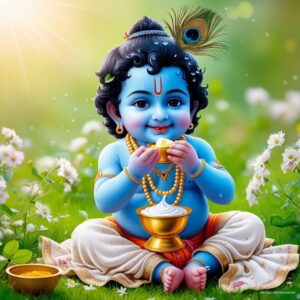Shri Krishna Janmashtami, the festival that marks the birth of Lord Krishna, a vibrant celebration filled with joy, devotion, and cultural richness. Every year, millions of devotees across India and around the world come together to honor this divine occasion on August 26, 2024. But what makes Janmashtami so special? In this article, we will explore the significance of this, the various customs and traditions associated with it, and how it brings communities together in a spirit of love and devotion.

The Significance of Janmashtami
Janmashtami, also known as Gokulashtami, is celebrated on the eighth day of the dark fortnight in the month of Bhadrapada, which usually falls in August or September. This day is believed to be the birthday of Lord Krishna, the eighth avatar of Lord Vishnu, who is revered as a symbol of love, compassion, and divine playfulness.
The Legend of Lord Krishna
The story of Lord Krishna’s birth is steeped in mythology. According to Hindu scriptures, Krishna was born to Devaki and Vasudeva in a prison cell in Mathura, where they were held captive by the tyrant King Kansa. To protect him from Kansa’s wrath, Vasudeva carried the newborn Krishna across the Yamuna River to Gokul, where he was raised by Nanda and Yashoda. Krishna’s life is filled with enchanting tales of his childhood exploits, including his playful antics with the gopis (milkmaids) and his role in the Mahabharata.
“Krishna is not just a deity; he is a way of life, embodying love, joy, and the essence of human relationships.”
Customs and Traditions
Janmashtami is celebrated with a variety of customs and rituals that vary from region to region. Here are some of the most common practices observed during this festive occasion:
Fasting and Prayer
Many devotees observe a fast on Janmashtami, refraining from food and water until midnight, the time believed to be Krishna’s birth. The fast is often broken with a feast of delicious vegetarian dishes, including sweets like laddus and kheer.
Dahi Handi
In Maharashtra, the festival is marked by the exciting Dahi Handi event, where teams of young men form human pyramids to reach and break a pot filled with curd (dahi) suspended high above the ground. This tradition symbolizes Krishna’s love for butter and his mischievous nature.
Midnight Celebrations
At midnight, temples and homes are adorned with flowers and lights, and devotees gather to sing bhajans (devotional songs) and perform aarti (a ritual of worship). The idol of baby Krishna is bathed and dressed in new clothes, and offerings of milk, butter, and sweets are made.
Cultural Programs
Many communities organize cultural programs, including dance and drama performances that depict the life and teachings of Lord Krishna. These events not only entertain but also educate the younger generation about their rich cultural heritage.
The Spirit of Community
One of the most beautiful aspects of Janmashtami is the sense of community it fosters. Families and friends come together to celebrate, share meals, and participate in rituals. The festival transcends social and economic barriers, uniting people in a shared expression of faith and joy.
Engaging the Younger Generation
In recent years, there has been a concerted effort to engage the younger generation in the celebrations. Schools and colleges often organize events that encourage students to learn about Krishna’s teachings and the values of love, compassion, and righteousness.
-
- Workshops on Krishna’s Teachings: Many institutions conduct workshops that delve into the philosophical aspects of Krishna’s life, encouraging students to apply these teachings in their daily lives.
-
- Art and Craft Activities: Children are encouraged to create decorations and participate in plays that narrate Krishna’s stories, making the festival a fun and educational experience.
Conclusion
Shri Krishna Janmashtami is more than just a festival; it is a celebration of life, love, and the eternal bond between the divine and humanity. As we come together to honor Lord Krishna, let us reflect on his teachings and strive to embody the values he represents in our own lives. Whether through prayer, community service, or simply spreading joy, we can all contribute to the spirit of Janmashtami.
As you prepare to celebrate this auspicious occasion, consider how you can share the joy of Krishna’s teachings with those around you. After all, the essence of Janmashtami lies not just in rituals, but in the love and compassion we extend to one another.
“Let us celebrate Janmashtami not just as a festival, but as a reminder to live with love and kindness every day.”
Happy Janmashtami!






























